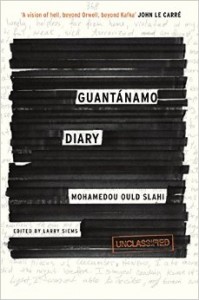‘Guantanamo Diary’: An Account of Justice Detained
Casualties in the wake of war on terror and blind apprehensions in the name of detaining ‘terrorists’ have started to come out in the form of first person narratives. What makes Mohammsdou Ould Slahi’s Guantanamo Diary stand out from similar titles like My Guantanamo Diary: The Detainees and the Stories They Told Me (2008) is its autobiographical nature, though author’s sketches have undergone editing by Larry Siems.
Therefore, Guantanamo Diary’ can be termed as the first narrative to be written by a detainee. Hailing from Mauritania, Mohammsdou Ould Slahi had been held in Guantanamo Bay since August 2002. It was from the detention center that he wrote the book. The book, diaries to be specific, narrates the story of Slahi’s experiences of torture, threats and humiliation that he encountered in his detention for almost thirteen years. It recounts the journey of detention from Mouritania to Senegal, from Bagram Air Force base in Afghanistan to Jordan and finally to Guantanamo.
Though the book was written in solitary confinement in 2005, the manuscript was held in Washington for seven years before it was released to the public. Larry Siems says in the introduction: “When he gets to Guantanamo, he gets there in time for this epic struggle for the American soul. You have the criminal interrogators for the military, and this new unit the pentagon sets up; defence intelligence agents, special project teams importing these enhanced interrogation methods. So Mohamedou lands right in the middle of that tug-of-war.”
The book narrates a story when a new interrogator was authorized to ask him about what he knows of another terror suspect’s travel to Iraq in 2003. When he told the interrogator that he was held in prison since 2001, so it is unlikely that he could have such information. Having heard this, the interrogator smiled and said that she was ordered to ask this question. The attention given to Mr Slahi’s memoir owes to his narration of suffering during a special interrogation which lasted for months in 2003 and was sanctioned by Donald H. Rumsfeld, the then secretary of Defence. The treatment meted out to him included sleep deprivation, loud music, fettering for days in a freezing cell, drowning in ice water, beatings, threats etc.
Mr Slahi narrates how he was forced to take a decision to tell the interrogators what they wanted to hear in order to escape from ruthless torture. Some interrogators doubted his confessions and asked for a polygraph test. Though he denied plotting terrorism or supporting Al Qaeda, the authorities disregarded his claims.
Following the Supreme Court decision in 2008, Slahi challenged the lawfulness of his detention in federal district court. The judge granted a writ of habeas corpus ordering Slahi to be released on march 22, 2010. The Judge Robertson wrote: “Associations alone are not enough to make detention lawful.” The department of Justice appealed the decision, which was heard on September 17, 2010. The D.C circuit court of Appeals vacated the ruling and remanded the case to the District Court on November 5, 2010 for further factual findings.
Slahi’s book, which has just been acquired at auction, is the first diary to be released by a still-imprisoned Guantánamo detainee, said publisher Canongate. Written in 2005, in his segregation cell, it started out as letters from the author to his lawyers, who fought for seven years to have the manuscript declassified. Parts still remain redacted.
Guantanamo Diary is not just a record of a denial of Justice, but an intense personal memoir, a document of great historical importance.























Connect
Connect with us on the following social media platforms.